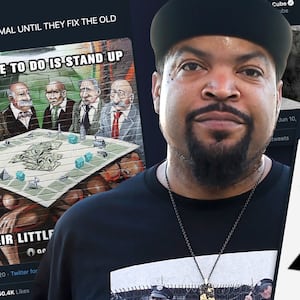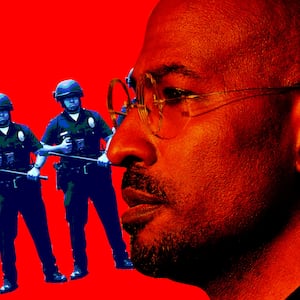It’s always confusing when Black celebrities gather around to pontificate about what needs to be done for Black America, like rapper Ice Cube, CNN pundit Van Jones, and others did on Jada Pinkett Smith’s Red Table Talk this week.
In the U.S., we’re supposed to be interested in political and historical analyses by crafty capitalists rather than by those who are currently living under the failed economic and social conditions that have been engineered by the few in power. Unsurprisingly, both Ice Cube and Jones have recently been on blast for collaborating with the Trump administration on policy instead of humbly joining one of the many organizations working to improve material conditions in Black communities. Jones worked with failson-in-chief Jared Kushner on policing while, as Trump senior adviser Katrina Pierson just announced, Ice Cube—who has been criticized for his long history of anti-Semitism—worked with the administration on the “Platinum Plan,” a capital-focused amalgamation of supposed reforms designed, on the surface, to put federal dollars in the hands of Black business owners like the rapper himself. Ice Cube tweeted today that this collaboration stems from his Contract with Black America plan (CWBA), and that both major political parties expressed interest.
“Facts: I put out the CWBA. Both parties contacted me. Dems said we’ll address the CWBA after the election. Trump campaign made some adjustments to their plan after talking to us about the CWBA,” Ice Cube tweeted Wednesday afternoon.
In general, the Platinum Plan is not an ambitious program to transform life for Black Americans and instead is full of qualifiers like “up to” and passive verbs like “examine” and “advance”—it mostly appears to be another example of Trump’s most lasting legacy: pulling stunts. Conservative policy like deregulation and small government are wrapped up in the race-conscious bootstrap rhetoric popular among wealthy Black people. Naturally, the plan touts “school choice” rather than full funding of public schools; dangles xenophobic immigration policy over Black communities as a way of supposedly bringing more jobs to the U.S.; slips in anti-abortion messaging under the guise of “defend[ing] religious freedom”; and finds ways to prop up predatory private industry through financial lending and healthcare.
The plan also equates the KKK and Antifa, falsely implying that anti-fascists are somehow responsible for lynchings of Black Americans. A collaboration with Trump, even if it is a matter of copy-paste, amounts to little more than an advancement of the president’s own narrow and narcissistic agenda; whatever gains you’re hoping to make are only ever incidental to his public image.
That Black male public figures like Ice Cube, Van Jones, and Kanye West (who has Kushner’s direct line and is now running a flimsy presidential campaign of his own in order to siphon votes from Joe Biden) think that their collaboration with an overtly racist administration will uplift Black Americans offers a living definition of hubris. What makes these men—and the party representatives that reach out to them—think that they are uniquely qualified to advise on major reforms for Black communities beyond their fame alone? The thinking seems to be that Trump, for his part, found his way to the highest office in the land with unhinged self-confidence and relentless bluster alone, so why not have these men make decisions for the rest of us?
Well, for one thing, organizers and community activists focused on abolition, climate, and labor have been building movements for decades and making important gains both within and beyond the two-party political system. These experiences have imparted crucial wisdom about the typically short-term gains made through collaborating with presidents (even the landmark Voting Rights Act of 1965 has been severely gutted) and the importance of collectively-designed strategies when engaging with those in power. Anyone curious to hear about these learnings could begin by reading histories of Black-led organizing within their neighborhoods and nationally or simply attending local meetings (virtually, for now).
Yet, it’s clear that when these under-informed and overconfident men march onto the scene, they’re less interested in contending with the messy, long-term work of community organizing and more eager to present as Black messiahs, ready to step up and get things done for their people. Perhaps it’s the mythologizing around figures like Martin Luther King Jr. and Malcolm X that have led to such ego-driven behavior. Though both men came from organizing backgrounds, whether via political organizations or religious ones, they stood out for the possibilities they represented with their powerful oratory skills and assured self-presentation. Media of course, spun that presentation into iconography; twisting their stories to make shadows of the men stand out and loom over the movements they were a part of. Nowadays, we see celebrities cosplay as the political icons of yesteryear—whether in biopic films or on the much more garish world stage. Perhaps it’s time, once and for all, to redistribute the attention they so desperately seek.



